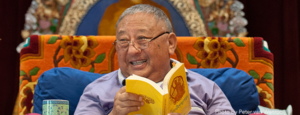The other day we talked very much about the preciousness of the human life. This preciousness is so true and so important. You don’t need the Buddhist teaching and the Central Philosophy to figure out whether or not life is precious. It is the good old American expression: you don’t need rocket science to figure this out. Anybody can see it. But the question is: what do we do? Each and everybody wants to do something great, at least not do something bad.
That’s what every good human being has in their desire. So what is that good thing you want to do? That’s where we go. We say: what does good thing mean? Many people think it means to make a lot of money and build comfort and build a huge monument to look back even after you are gone. That’s what people do. That’s why people build so many things, right?
There was an interesting Tibetan poet, a very funny guy in the mid 1900s. In those days, Tibet was still completely closed. But this guy sneaked out of Tibet. Tibet had a very funny rule. They would not let anybody else come into Tibet, nor did they allow Tibetans to go out – for centuries. We thought the snow mountain boundaries were a huge protection realm. No one can get in and no one can get out. They knew they were sacrificing development for the people and the country. They were not stupid. They definitely knew. But they did this to protect the purity of Buddha’s teaching. They didn’t want any contamination at all. They thought that getting contact to the outside would contaminate that. But this guy somehow sneaked out and went to India. He joined with a lot of Indian Buddhist poets. He led this crazy double life. He was a monk and later a lay person. So he led this double life, but at different times, not together. He was such a great poet. He ended up being the author to compose the national anthem of Sri Lanka, then known as Ceylon. He gave his name as Dharmarakshita, or something like that. In one of his writings he said that everyone is trying to leave something behind to look back after they are gone. Some will leave children, some will leave memorial institutions. Some will leave monuments.
That’s true. People will always try to build something. That something becomes your legacy. I don’t know if any spiritual practitioners try to build a legacy. Whatever efforts you put in, that becomes your legacy. So whatever efforts you put in, you always try to make it something good. That goodness we see differently with different eyes. For some it is wealth, for some health, for some it is spiritual. Very few people will really have a good role model for spiritual development. This is our problem. At least we who have this opportunity will know what “good” we are talking about.
Even within that goodness of the spiritual path, love-compassion oriented, you have so many ways of pulling – this way and that way. For some people it is such a priority. People do accept compassion and love. But we don’t really know what compassion is. We don’t know what true love really is. That is somehow interpreted, and people do all kinds of things. But all are good. That’s great. Wonderful. It is good to help people and set up a society which is service-oriented. All that is great. I am not criticizing. It may sound like that, but it is just that I have something more to say. But I am not criticizing. It is great, but not good enough for us.
What is really good and what we really need is to end the suffering. Honestly. That has to begin with ourselves. It is yes to compassion and yes to love, and yes, it should be for all mother sentient living beings. But first, it is me. If you don’t care of yourself who else is going to take care of you? That’s one thing. Then if you don’t do it now, when would you do it? There will be no better time. With these two reasons our goal should be more than material service, more than helping. Helping is definitely part of it, but it is me – and each and every one of us has to point the finger to ourselves, saying, “me” must at least end my suffering once and for all. That’s important.
~ Gelek Rimpoche, Jewel Heart Ann Arbor, November 18, 2012


